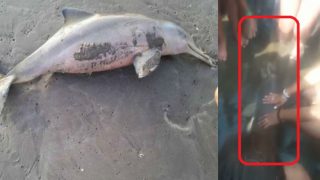A male Indo-Pacific bottlenose dolphin is the first known cetacean to die from asphyxiation by octopus, i.e., the dolphin was choked to death by an octopus, states a new study. The study was conducted by researchers at Murdoch University in Perth, Australia. The young male dolphin was found on a beach which is about two hours to the south of Perth. He was brought to Stephens’ lab for a post-mortem in August 2015. An article in the National Geographic states that at that time, bits of a Maori octopus were still hanging out of his mouth. The problem reportedly arose when Gilligan, the dolphin, tried to swallow the whole octopus. The autopsy has been described in a recent study in the journal Marine Mammal Science.

Oymyakon, World's Coldest Village Records a Temperature of -62°C Before Breaking the Thermometer
Study leader Nahiid Stephens, a pathologist at Murdoch University in Perth, Australia, states that the dolphin became really greedy and perhaps thought ‘You know what, I’m going to swallow it whole.’ In the past, there have been several instances of dolphins killing and eating octopi. So Nahiid conducted a research to find out what went wrong this time. She began by removing the octopus. She has been quoted saying, “It really was a huge octopus, I just kept pulling and pulling and thought, ‘My god! It’s still coming,'” and added that it had a tentacle span of 4.2 feet.

Baby Dolphin dies because of people’s selfie obsession once again! Watch tragic video
Interestingly, Dolphins have the ability to disengage their epiglottis — a flap of tissue that connects the larynx to the blowhole — to open up their throats and swallow larger pieces of food. In this case, Stephens says that the 4.6-pound cephalopod seems to have grabbed onto Gilligan’s larynx with a tentacle. This prevented it from reconnecting to the dolphin’s breathing apparatus, thereby suffocating him to death. Tthe octopus might have been dead in theory, but its sucker was still functional. This gave it an advantage over the dolphin, explains the researcher. Reports state that while Gilligan’s death is a first as far as scientists are concerned, there is a possibility that this happens more often in nature.